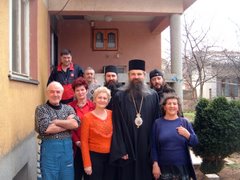Nations Take Sides Over Kosovo
Rift Widens Among Nations Over Kosovo
The Associated Press
By WILLIAM J. KOLE
January 26, 2007
But it will be an acceptable package, we believe, for the people of Kosovo
Russia is pressing for more time to examine a U.N. proposal for the future of Kosovo, Western and Russian officials said Friday, underscoring a widening rift between Moscow _ a key ally of Serbia _ and the United States and its European allies.
'Russia wants a longer period' to consider the plan, which U.N. special envoy Martti Ahtisaari presented in Vienna to diplomats from the so-called Contact Group _ U.S., Russia, Britain, France, Germany and Italy _ a Western official told The Associated Press.
Other members of the Contact Group insisted that 'we've got to set a time limit' on the roadmap for the independence-minded province, said the official, who was not authorized to discuss details of the proposal and spoke on condition of anonymity.
Russia is a traditional ally of Serbia, which considers Kosovo the heart of its ancient homeland and insists that it remain part of Serbian territory. Kosovo's ethnic Albanian majority has been pushing for outright independence.
The U.N. Security Council will have the final say on Ahtisaari's plan, which the former Finnish president will formally present to both sides on Feb. 2.
Moscow's apparent misgivings _ and its veto power at the U.N. _ have raised the possibility of a diplomatic showdown with the United States, which backs the province's drive for statehood.
The other members of the Contact Group 'agreed that the plan should go to the parties' without delay, the Western official said. But a Russian diplomat told the AP that the Kremlin 'would prefer to wait' at least until Serbia, which held parliamentary elections earlier this month, forms a new government.
'We would not favor hasty moves,' the Russian official said. The Russian official also was not permitted to discuss the proposal publicly and spoke on condition of anonymity.
Ahtisaari's deputy, Albert Rohan, called Friday's meeting 'very good and positive,' but declined to provide details. The diplomats planned to take the document to their capitals for further review, spokesman Remi Dourlot said.
In Pristina, Kosovo Prime Minister Agim Ceku reacted with impatience to the Russian request, insisting: 'There are no more reasons to delay the status process.'
Ceku said he realized the proposal 'may contain elements that are not that favorable _ not all will be what we want.'
'But it will be an acceptable package, we believe, for the people of Kosovo,' he said. 'I am confident that Kosovo will be independent and that when Ahtisaari goes to the Security Council he will propose independence for Kosovo.'
His deputy, Lufti Haziri, said the U.N. blueprint was crafted around 'two main issues, two main principles: Kosovo's right to its future and Kosovo's obligations toward minorities.'
But diplomats and officials have said the proposal likely will not mention the word independence, although it is expected to give Kosovo some attributes of a sovereign state, such as access to international institutions and provisions for a security force.
Kosovo has been under U.N. control since mid-1999 _ when NATO airstrikes ended former Yugoslav President Slobodan Milosevic's crackdown on ethnic Albanian separatists _ and is currently patrolled by a 16,000-strong NATO-led peacekeeping force.
Ahtisaari has said his plan focuses on the protection of Kosovo's small Serbian minority and envisages a strong international presence backed up by the NATO peacekeepers.
International mediators have held yearlong talks between ethnic Albanian and Serbian leaders on issues such as giving self-rule to Serbs in areas where they form a majority, protecting their religious and cultural monuments and offering them constitutional guarantees so they are not overruled.
Oliver Ivanovic, a moderate Kosovo Serb leader from the ethnically divided city of Kosovska Mitrovica, said he was briefed earlier on key elements of the plan. He said Serbs 'will have special rights in security, health services, education and cultural matters.'
Diplomats said the plan also outlines post-status international supervision, with the European Union's top envoy in Kosovo likely to have veto power over laws and government decisions.
That would resemble the Dayton accords that ended Bosnia's 1992-95 war and established an international administrator to oversee that country's day-to-day affairs.

















